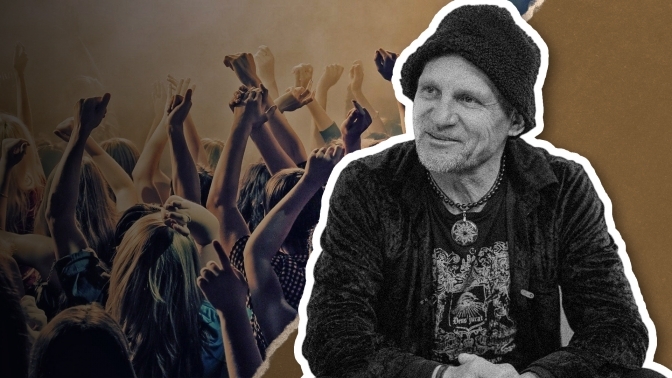
[For daily insights from throughout Ukraine, follow Ukrainian Freedom News on Telegram]
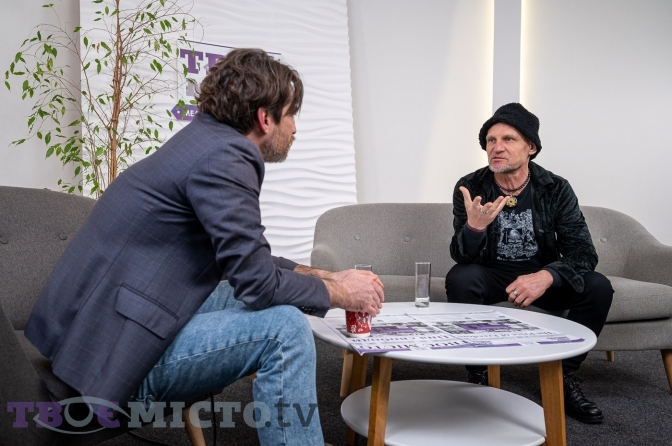
Today we have a special guest. The 1995 album «Krayina Mriy» (Land of Dreams) on cassette was an event for me, then a student of Lviv University. I listened to this recording on a cassette player to the holes. This album made a huge impression on me. I was a fan of The Doors, I listened to Pink Floyd, a lot of classical and all other kinds of rock. Of course, I listened to [Ukrainian bands] «Plach Yeremii» and «Mertvyi Piven», later – «Komu Vnyz». And here emerges something that is neither American, nor British, nor typically Lviv or western Ukrainian style, but still very Ukrainian, driving, and cool. I wanted to start our conversation with this, to say that this was actually a very important album for me.
Thank you!
And then «Vesna» (Spring) song appeared. I also remember it very well, because it was something you could dance to in a nightclub. It captivated all people whether they listen to rock music or not. There was a feeling that it somehow helped, and the ice broke, because not only Lviv and Ukrainian-speaking regions listened to it. Perhaps it was visible from here, but it was a huge breakthrough at the national level. However, in my opinion, «VV» and Skrypka were allegedly «hid in the shadow» recently, you were less heard before the start of the war. Have you had the same feeling, and if yes, what is it about?
I always had this feeling. That is, «VV» have always been, as you say, «hid in the shadow». It is like borscht – it is also «hid in the shadow». That is, we all go for ravioli, for pizza, and borscht is always nearby. And when we grow older or go abroad, we remember: «Oh, but that’s great!» Now I play concerts almost every day and I see this reaction from people: «Where have you been before?» I’ve always been here. But there is always something more important. There is, of course, [Ukrainian classical] song «Ridna maty moya» (Native mother of mine), but there are also Italians who were fashionable in the 80s of the last century. Then Russian rap was also fashionable, and today, «Bayraktar-style» and all this electronic music are very fashionable.
Perhaps this is the secret of the fact that «VV» and my music have been on the scene for so many years and are still relevant. I have never topped the charts. It is very rare to win something at these rating contests like «who made the best clip». Often I’m not even invited to them.
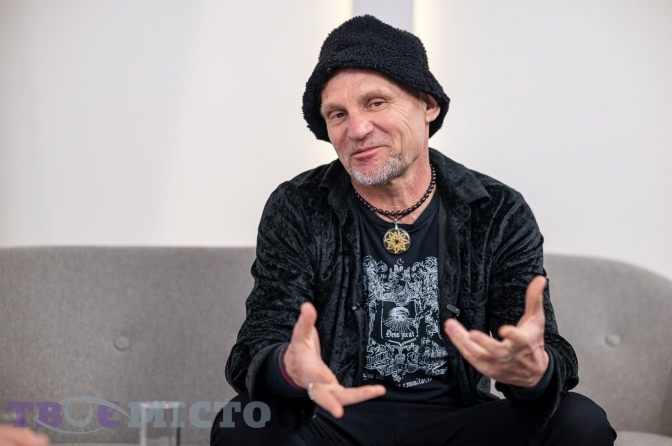
Now on Spotify and other platforms, Russian and Russian-language songs are trending in Ukraine. How do you feel about it?
This is just the Russian influence. We haven’t lived without Russian influence yet. So, let’s say, the grass that breaks through the asphalt does not yet know how to live simply on the lawn because it constantly lives while being covered by the asphalt paver. I live like this all the time, and Ukrainian-language, really Ukrainian content is in this state all the time.
It’s just that now, everything has changed. The Russian-speaking influence, of course, has weakened, but the Russian one has not. We have always had two enemies – our pseudo-brothers and our Ukrainian cretinism. Pseudo-brothers cooperated with Ukrainian cretinism. And this, let’s say, Ukrainian lack of taste, which they cultivated for many years, is a great ally.
Where did this lack of taste come from? Just because this is a «rural» nation?
I do not know. As for the «rural» nation, urban culture was destroyed in our country, except for Lviv and several other western cities. Kyiv’s urban culture was definitely destroyed by 99 per cent. And, in fact, culture was preserved in the village. As a person external to the Ukrainian world, I came to the Poltava village and felt it. Children address their parents by «Vy» [respectable form of «you» in Ukrainian language], there are all these «feng shui holidays», all this beauty…
And everything with taste!
With great taste. Especially if we talk about folk music, or embroidery. Who has seen antique embroidery before the 1960s – everything is beautiful. But in the 1970s, this cross-type sewing already appeared, this modernism of the 70s interfered with traditional culture, and the taste disappeared. These houses under the slate began, and in the 1980s – in general, these broken forms in architecture, clothes, «pyramid» jeans, «bat» jackets. This horror echoes and the taste is broken. It also broke down in the world. Perhaps, this Soviet person appeared after all in the 1970s. There was such a task – to create a Soviet man. The Soviet Union does not exist, and in Ukraine, this Soviet person still lives, because the «what a difference» slogan, all these manifestations constitute a Soviet person who is still alive.
Now, the world is being Ukrainized, but Ukrainian-language content of low quality is a Soviet product. We must set ourselves the task of making the Ukrainian world a high-quality, cultural one. Then we will surely win our country.
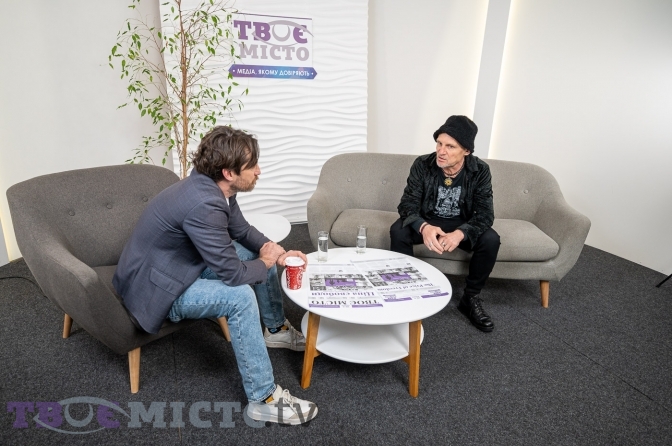
Recently, I discovered the world of Hungarian rock music of the 1970s. It turns out they had some incredible bands. But when you read that some psychedelic album of 1976 was recorded by Syrius in Australia, you understand what a huge gap there was, how much more freedom was there. They did not completely disconnect from European culture and civilization. Did you feel like pioneers of some alternative scene of the early 1990s when you came to Ukraine from France?
We came from France after we left Ukraine. In Soviet times, I used to come to Lviv, where you could already «catch» Polish television, on which their rock bands performed.
In the 1980s, there were Polish festivals like Zielona Góra, Polish rock and rap. And here you had these sources of information. I grew up in the Murmansk region [of Russia], spent my childhood there, and that is where my musical outlook was formed. We had an interesting situation: international competitions were held at the local ski resort, athletes came and brought «vinyls». We also had the Murmansk port, and sailors also brought «vinyls». So we had music. For example, I listened to Pink Floyd’s 1979 album The Wall in the same year. That is, we got access to music very quickly. Queen’s 1975 album A Night at the Opera also came very quickly. We grew up on this western music. In addition, my generation did not perceive Soviet music in general, this whole «Kobzonshchyna».
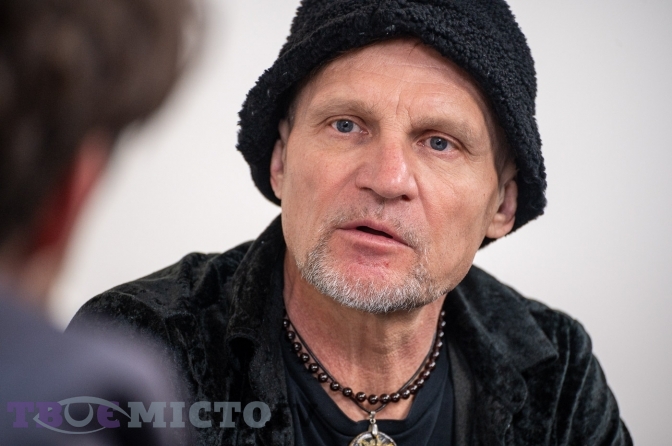
What was wrong with it: are the songs insincere, or maybe there’s some kind of Chinese melos?
No, I mean quality. You can philosophize about this for a long time. The selection of Western music turned out to be very positive, although we had very little of it. And when I already lived in Europe, I realized that there was a lot of all kinds. There was also low-quality music, but we were brought up on the highest quality, on gold nuggets. And to this day, I have this very high level. When I listen to something and it doesn’t reach the quality of Led Zeppelin, to put it bluntly, it seems to me the same as the noise of a coffee maker. In 15 seconds, it goes «in the trash» – and that’s it, I don’t perceive it as music.
It took us 30 years to start giving up Russian music and Russian content en masse. It was the so-called gentle Ukrainization. What should this story teach us?
In fact, two opposite processes took place. One has been going on for 300 years, when the Russian Empire was digesting us. We are a great nation, I read that 100 years ago there were 150 million of us, and now there are only 30. This world swallowed us like a python of a rabbit and digested it little by little. And when the Soviet Union collapsed, we gained quasi-independence, plus the Internet and other things – and we began to have a small internal cultural life, to drift sideways. They also have the Internet, new tools, and they also started with their raps, their bloggers and, in principle, they do not stop digesting us. But Putin hastened the war because he wanted this process to end during his lifetime. Their plans broke down, and we have what we have.
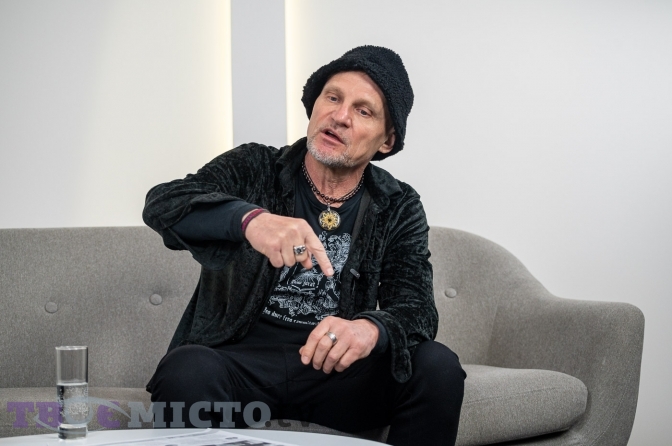
Maybe, they saw that little by little, the second process of slow Ukrainization was prevailing quantitatively and qualitatively and worried that at some point, it would be too late?
Maybe that’s why they hurried. Although Ukrainianization was so gentle, slow and inadequate that they could break us at the knee.
Now can we afford some more soft Ukrainization?
No. I have never been soft at all. When I was asked: «If you were the prime minister or the president...» I immediately continued: «... only cultural dictatorship, cultural hetmanate and radical actions.»
Before the war, the thesis was very popular: do not put pressure on us, offer a better product and free competition, – and then gradually, everyone will switch to Ukrainian. Even now, they say this sometimes.
As for radicalization, I am talking about the fact that one must radically support what is his own. Trying to ban something is like a «dry law» [prohibition of the sale of alcoholic beverages] that has not led to anything. For example, I am involved in wine industry, and this is the promotion of high-quality, good Ukrainian wine. This is how we can overcome alcoholism. The same with the support of quality Ukrainian music. But what is quality Ukrainian music? Ukrainian official and society perceive the quality of Ukrainian music by the number of views on YouTube and likes on TikTok. For them, this is quality, just like Eurovision. Ukrainians deal with that «Eurovision» like a fool with a bag of paper, and this is just a tool of gentle de-Ukrainization.
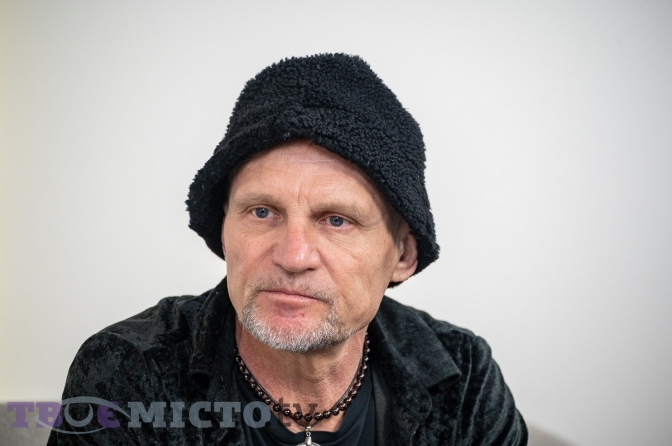
Is there enough competition? Now, everyone wants a conditional, as you said, «Bairaktar-style». When you turn on many radio stations, it’s all about the same theme with the same set of words and the same voices. Sometimes it seems that one band is singing. This is something so patriotic and a little «hop-tsa-tsa» in the Ukrainian language.
The fact is that we have a cultural disaster. In particular, due to Russian influence. The structure of the show business has not changed. So the question is: if we changed the language, did the Russian influence disappear? I say that the Russian influence is Russian-language content and the presence of some Ukrainian-speaking idiots on air. If we take away the Russian-language content, and the influence remains, the mechanism is the same, then the task is to make it just a low-quality product. And it is necessary to set a task, so that there is a quality product, so that content is returned to music, and not just words, about freedom
Should this be state policy?
I don’t know what the policy is. There must be a result. But how to do it – you have to think.
It is easy to imagine that some minister of culture, not the one who is in position now, is sitting and saying: «Do you know that we have a problem? The music of freedom is rock music, we have a problem with rock music. Let’s do cool festivals, concerts? We will give a billion hryvnias for it.»
You and I are a generation of rock aesthetes, and that is in the past. Rock music today is like jazz, like opera, like operetta. This is a classic, it no longer resonates with young people. I would like my son to sing rock, but he doesn’t want to.
He raps, right?
Yes, he raps. He sings, but rock music is not very relevant today. There must be quality. Who understands this? There must be some experts, people who really understand, whose expert assessment we trust.
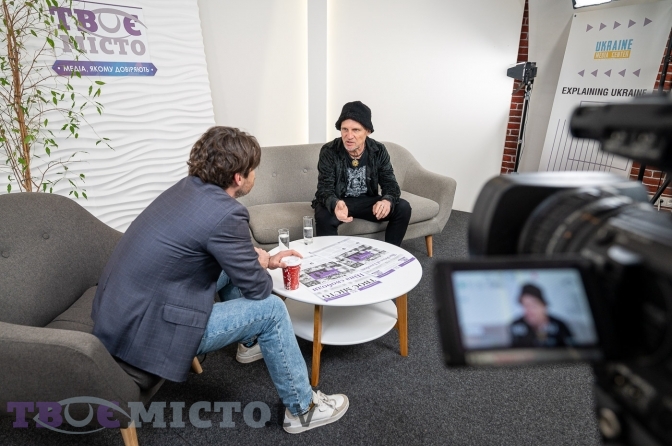
All the same, it turns out that one way or another everyone somehow subconsciously returns to folk melos, folklore melos. Is this a tribute to fashion or an attempt to find the sound of Ukrainian music? Sometimes it looks quite ugly. Maybe it just takes time? After all, you were also involved in folk music at one time.
Well, I was abroad and always had an external view of Ukraine, saw real values. When I went to the village, I liked potatoes from the oven and sour cream the most. You just eat this potato with a spoon and get sour. And my grandfather asked me to bring him Fanta from the city. The same with music. Let’s imagine that Ukraine is a village. People think they’re very modern if they’re consuming this local booze, some local R&B that’s very similar to American 30s, 40s. This is the kind of «village fashion» that is taken so that we «sound out to the whole world» and presented in New York. People look at it, and if the Ukrainian language is replaced by the language of Burkina Faso, nothing will change: it will just be a village that has put on jeans with lurex arrows.
Do you belong to the people who believe that if Ukrainians did not listen to Russian music, did not speak Russian, then perhaps this war could have been avoided?
Didn’t speak Russian? Yes. If we had stronger immunity. I recently learned about an interesting historical moment. We had Rus’, then we got a chance – the Cossack state. We were under Poland when it weakened, and Russia was still weak, and at that moment, the Cossack state arose. First, under Khmelnytskyi, who freed us from Poland, but the Russians scooped him up. Then Mazepa appeared and, thanks to the Swedes, made an attempt to liberate Ukraine from Russia. But Mazepa, although he was the wisest politician in the world at that time, did not take into account a stupid and very simple point – propaganda. Propaganda did not exist then, Peter I invented it. They put anathema on Mazepa through the Ukrainian churches, and the Ukrainians believed. Ordinary Ukrainians met the Swedes with weapons because they were told that Mazepa wanted to sell Ukraine to the Poles. Ukrainians, especially in the west, did not yet know how bad it was under the Muscovites, but they knew how bad it was under the Poles.
This is how Ukrainian stupidity and naivety worked. And it works to this day. «Good Russians» flooded the Internet as bloggers, Ukrainians watch Russian bloggers. «Good Russian» musicians rebelled against Putin, went on tours around the world, where there are many Ukrainians. Russian-speaking Ukrainians go to those performers, Zemfira and the like. But the stage is not rubber. And when, for example, I go abroad, I can no longer gather an audience, because there the «Good Russian», and Loboda and Monatik [Ukrainian pop-singers] have already «combed» everything through. They use this tool again. Yesterday at the concert, I was asked the question: «Do the «Good Russians» exist?» And I did not immediately find an answer to it. No questions! Learn the Ukrainian language, switch to it – and you will be a «good Russian». Not even dead, but simply Ukrainian-speaking.
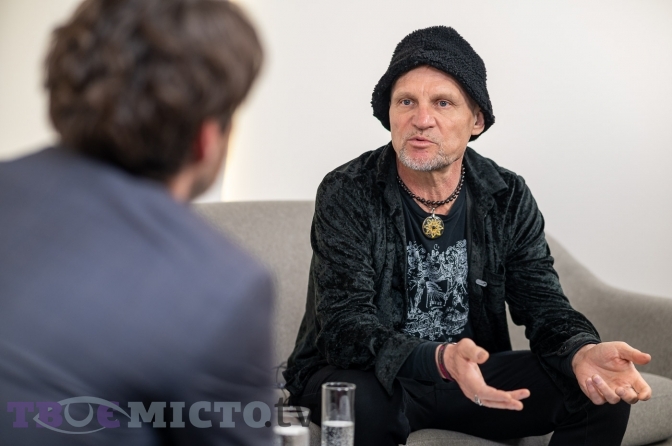
If to rub the «good Russian», then maybe, he would no longer be Russian, but a representative of another culture?
If a person really recognizes the existence of Ukrainians, wants to communicate here, let him learn the language. When I lived in France, it was very simple for me: you know French – you can work, communicate. If you don’t know it – then you are somewhere in outer orbit.
Yaroslav Hrytsak said very well that, in fact, all Ukrainians are people «by choice», because a little more than 100 years ago, Ukrainians did not exist. Ivan Franko said that he was a Rusyn, all were Rusyns, Little Russians, and there was a problem with the Ukrainians. This is the identity that everyone chose 100-150 years ago and is still choosing. What is the minimum set for you now to be called Ukrainian?
Language is the basis, it must be mastered. Indeed, I respect those Russian-speaking soldiers who are at the front, but all the same, even a little, you are grist to someone else’s mill. It must be understood that you are weakening Ukraine and strengthening Russia.
However, one should not be too radical, cruel to people. There are people who are more capable of languages, and there are less capable. As a musician, languages come easier to me. But at one time I realized that it would take me two months to learn the language. If a person does not have the ability to speak – six months.
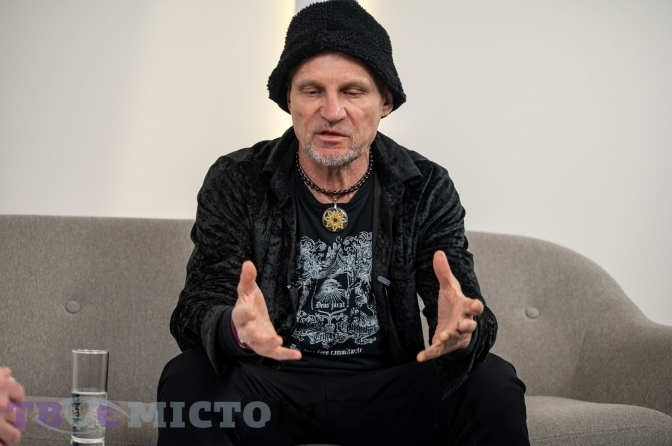
And finally, I will ask: you popularized «Schedryk» and Christmas celebrations. This is also part of the Ukrainian tradition. Can it become common for all Ukrainians, or should it?
A Christmas tradition?
As an example.
My thesis: there is spirit, there is matter, but still, spirit is primary. On the terrain, on the Christmas front, we have already won – everything. When «Shchedryk» was played on a joint TV marathon after the president’s speech – that’s all. Ukrainians already know what a carol and a nativity scene are, they sing carols, they know who the three magis are, who Herod is, all these images have already appeared. And if we carried out this small cultural revolution in Ukraine, it happened on the basis of Christmas, then we will definitely win the war. It is very symbolic, very important. Christmas is the birth of a new world, there are so many symbols that one can philosophize for a very long time. This is a very good sign for me.
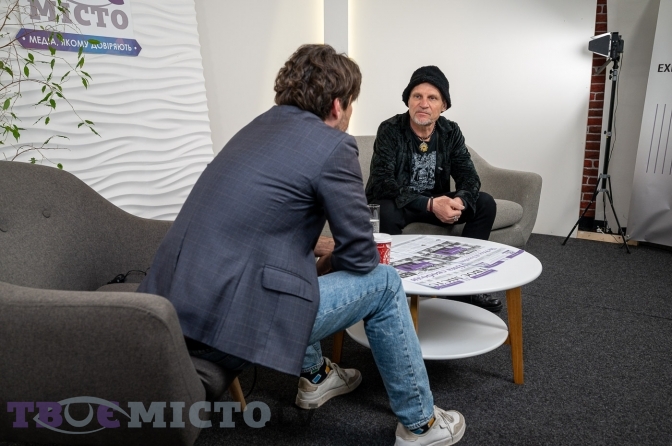
When I started playing my rock and roll, I had another thesis: artists do something, write something and cannot explain it to themselves. It turns out that time is symmetrical. We are in the now, there is a past and a future, and we are affected by both. Especially the future. Creative people are open to it. When we do something, we are simply affected by the future, so it resonates. I wrote the song «Hometown, the city of Kherson». Why? I have not been there, I do not know this city, I have no relatives there, no one. And now, Kherson was liberated, and this song simply «shot». I myself understood that I really somehow felt that Kherson would be key in our situation: not only in the war, but in general in the concept of freedom. The price of freedom is Kherson. And it turns out that it is true. And when you watch the old clip, it is already revealed in the context of today’s events, in particular, why there are such images.
It wasn’t all by accident.
Certainly. As a creative person, I will say: no matter how difficult it is for us, we must look at the beauty of today’s moment. We live in such an important time, which is key for Ukrainians. We are so lucky! So we mentioned Franko, and not only him. These people invested so much in the future of Ukraine, which is now unfolding like a lotus flower, right before our eyes. This does not happen for centuries, but very quickly, literally within a year, so that we observe the beauty of what we have, enjoy it…
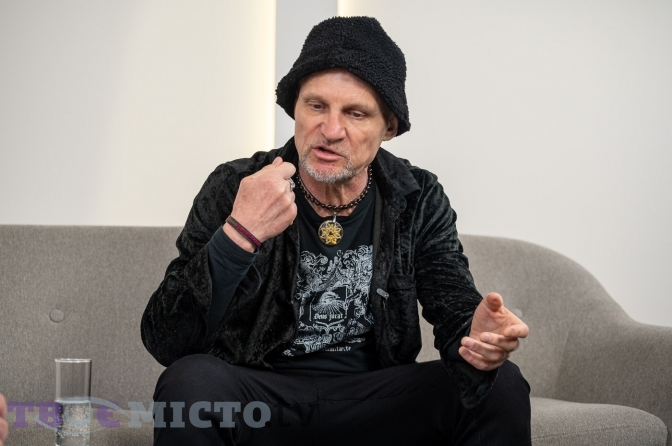
…and remember who actually helped us to this point and paid for it.
That it gives us energy, that we appreciate the energy of our life, those people who died for it, their love. I got very emotional.
Andrii Saichuk spoke
Text: Marichka Ilyina, translated by Vitalii Holich
Photo by Ivan Stanislavskyi
Follow us on Facebook and Instagram. Lviv Now is an English-language website for Lviv, Ukraine’s «tech-friendly cultural hub.» It is produced by Tvoe Misto («Your City») media-hub, which also hosts regular problem-solving public forums to benefit the city and its people.












